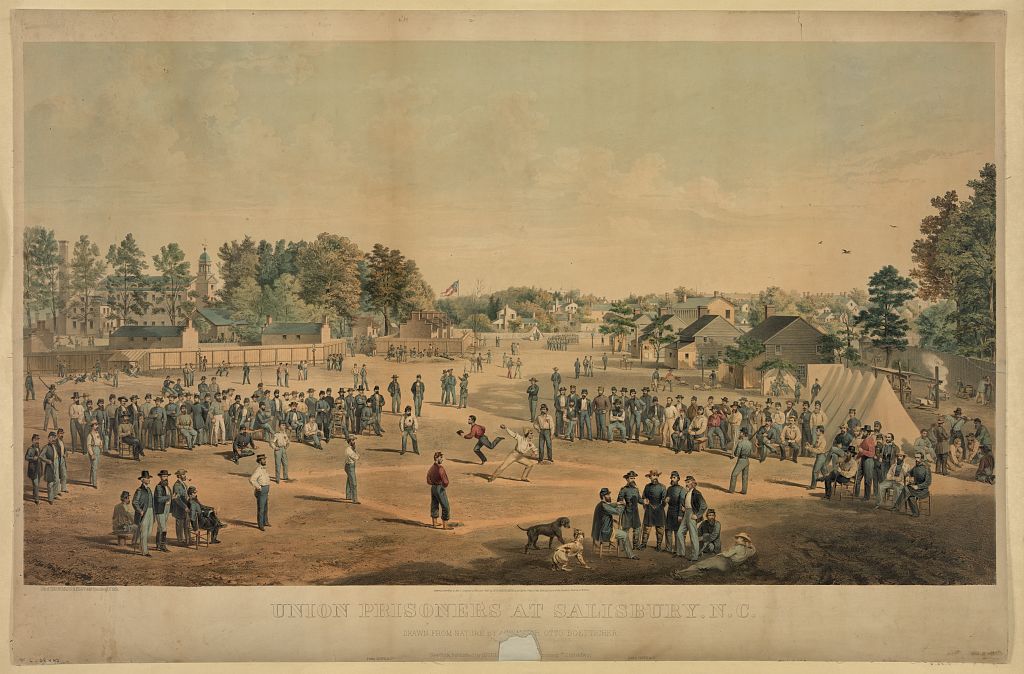Historian and You Stink! author Michael Aubrecht offers a look at the great American game, baseball, and its Civil War era roots.

Baseball is considered America’s National Pastime. Far more than just a mere sporting event, baseball has become a major part of the American consciousness. During war, following natural disaster, or in the midst of economic hardship, this “game” has always provided an emotional escape for people from every race, religion and background who can collectively find solace at the ballpark. Therefore, it somehow seems fitting that the origins of modern baseball can be traced back to a divided America, when the country was in the midst of a great Civil War. Despite the political and social grievances that resulted in the separation of the North and South, both sides shared some common interests, such as playing ball.
Although a primitive form of baseball was somewhat popular in larger communities on both sides of the Mason Dixon line, it did not achieve widespread popularity until after the start of the war. The mass concentration of young men in army camps and prisons eventually converted the sport formerly reserved for “gentlemen” into a recreational pastime that could be enjoyed by people from all backgrounds. For instance, both officers and enlisted men played side by side and soldiers earned their places on the team because of their athletic talents, not their military rank or social standing.
Both Union and Confederate officers endorsed baseball as a much-needed morale builder that also provided both mental and physical conditioning. After long details at camp, it eased the boredom and created team spirit among the men. Some soldiers actually took baseball equipment to war with them. When proper equipment was not available they often improvised with fence posts, barrel staves or tree branches for bats and yarn or rag-wrapped walnuts or lumps of cork for balls.
Sometimes games would be interrupted by the call of battle. George Putnam, a Union soldier humorously wrote of a game that was “called-early” due to the surprise attack on their camp by Confederate infantry, “Suddenly there was a scattering of fire, which three outfielders caught the brunt; the centerfield was hit and was captured, left and right field managed to get back to our lines. The attack…was repelled without serious difficulty, but we had lost not only our centerfield, but…the only baseball in Alexandria, Texas.”
Many of these contests were attended by thousands of spectators and often made front-page news equal to the war reports from the field. Ultimately, the Civil War helped fuel a boom in the popularity of baseball, evidenced by the fact that a ball club called the Washington Nationals was born in 1860–145 years before a Major League Baseball team was given the same name in the nation’s capital city of Washington D.C.
In 1861 at the start of the war, an amateur team made up of members of the 71st New York Regiment defeated the Washington Nationals baseball club by a score of 41 to 13. When the 71st New York later returned to man the defense of Washington in 1862, the teams played a rematch, which the Nationals won, 28 to 13. Unfortunately, the victory came in part because some of the 71st Regiment’s best athletes had been killed at Bull Run only weeks after their first game. One of the largest attendances for a sporting event in the nineteenth century occurred on Christmas in 1862 when the 165th New York Volunteer Regiment (Zouaves) played at Hilton Head, South Carolina with more than 40,000 troops looking on. The Zouaves’ opponent was a team composed of men selected from other Union regiments. Interestingly, A.G. Mills, who would later become the president of the National League, participated in the game.
According to George B. Kirsch’s 2003 book “Baseball in Blue & Gray,” John G.B. Adams of the 19th Massachusetts Regiment recounted that “base ball fever broke out” at a Falmouth encampment in early 1863 with both enlisted men and officers playing. The prize was “sixty dollars a side,” meaning the winning team paid the losers that sum. “It was a grand time, and all agreed it was nicer to play base than minie [bullet] ball.”
Although early forms of baseball had already become high society’s pastime years before the first shots of the Civil War erupted at Fort Sumter, it was the mass participation of everyday soldiers that helped spread the game’s popularity across the nation. In his 1911 history of baseball titled “America’s National Game,” Albert G. Spalding wrote, “Modern baseball had been born in the brain of an American soldier. It received its baptism in the bloody days of our Nation’s direst danger. It had its early evolution when soldiers, North and South, were striving to forget their foes by cultivating, through this grand game, fraternal friendship with comrades in arms.”
He added, “No human mind may measure the blessings conferred by the game of Base Ball on the soldiers of our Civil War. It calmed the restless spirits of men who, after four years of bitter strife, found themselves at once in a monotonous era, with nothing at all to do.”
Please drop in to the entertaining, informative, and all too often woeful website You Stink!